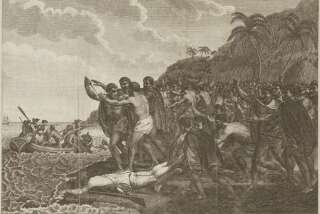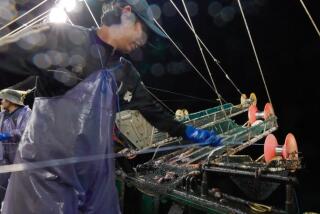A Fish of Many Tales
COD: A Biography of the Fish That Changed the World By Mark Kurlansky; Walker & Co.: 294 pp., $21
If you want to know anything about food in the real world, the last place to look is cookbooks. These days, they’re mostly too busy selling people on the romance of the tiniest home kitchen accomplishment to address such questions as: “In the natural order of things, what is this stuff?” “Who brings it to consumers?” “At what cost?” And I don’t mean the retail price.
Fish cookbooks are a case in point. They avoid the kind of talk you hear when people who know something about the state of commercial fisheries exchange candid opinions about the environmental toll of fishing. I know of only one major fish cookbook that devotes more than an evasive sentence or two to the ecological dilemmas of modern fishing--”Das grosse Buch vom Fisch” (“The Great Book of Fish”)--a magnificent photographic book published 10 years ago by the German firm Teubner and never translated for publication in the United States.
But someone here has at last decided that attention must be paid. In “Cod: A Biography of the Fish That Changed the World”--not a cookbook per se, but an elegant brief history with a good scattering of recipes--Mark Kurlansky sounds a well-planned wake-up call to all who care about fish.
You could read Kurlansky just for the intrinsic fascination of the fishing lore and the charming nosegay of about 40 recipes (medieval to very modern) that he’s collected to show historical cod cookery approaches and the incredibly wide Iceland to Brazil appeal of this ancient staple. (Do not expect them to be written in standard modern “recipe” format.) But something more is going on here.
With great acumen, Kurlansky has chosen codfish as a vehicle to sum up issues that would be hopelessly sprawling if related in their full dimensions. To place his achievement in context, it’s necessary to understand a few things about marine ecosystems.
Ocean fish occupy niches with reference to particular conditions like water temperature and the availability of their chosen food, matters not defined by national boundaries. Their life cycles may take them to several crucial places far from where they’re fished, and they may shift feeding or breeding grounds without notice.
Centuries ago, when most schooling fish were caught in small quantities fairly close offshore and promptly consumed by the locals, no one understood the environmental implications of the business--or needed to.
Stage by stage, nautical distances were conquered by improvements in navigation and shipbuilding that redrew the environmental picture without anyone realizing. In modern times came revolutions in fishing technology. Catches began to grow--slowly at first, then at a stupefying rate that initially seemed to confirm preconceptions of the ocean’s limitless bounty. Eventually, the time dawned when a few vessels could clear out whole fishing grounds and process the catch in a matter of days.
This century has ushered in the consequences, a series of spectacular collapses of fish stocks not fully acknowledged until the last couple of decades. As PR campaigns switch consumers’ attention from nearly extinct species to previously undervalued ones that in their turn are quickly overfished, the apparent abundance of fish varieties in our markets camouflages the problem from retail consumers. It’s a matter of robbing Peter to pay Paul on a global scale.
The foregoing jeremiad is not exactly the book that Kurlansky has written. But those familiar with commercial fishing issues will see at once that his “biography” of cod obliquely presents almost every detail of the same scenario under the guise of a pleasant sea yarn.
Neatly limiting his focus to one (unfortunately all too illustrative) species and writing in a deceptively mild-mannered tone, he constructs an unmistakable picture of disaster, all the more incisive for being agreeable and laid back.
The story begins with the earliest organized European attempts to tap into one of the world’s most extraordinary marine resources. Codfish happens to be one of the species best adapted to simple, ancient preservation methods, including salting. Not coincidentally, it was one of the first fish people learned to hunt over huge distances, starting with the Vikings and the Basques, who ventured far west into its cold Atlantic ranges.
As Kurlansky’s narrative wandered gracefully from the character and habits of Gadus morhua (Atlantic cod) and the merits of different curing methods to the great opening up of the North American fishing grounds by jockeying European interests in the 16th century, I had the book pegged as a civilized, painless little summer read of modest consequence.
The light dawned when I reached one of those romantic-seeming tales of the honors once bestowed on the official cod emblem of the Massachusetts Legislature, and turned the page to read:
“All of which proves that New Englanders are capable of great silliness.”
The silliness is boasting about one bit of history without admitting to the embarrassing baggage it carries. As Kurlansky points out with a cool sting, salt cod filled one lucrative corner in the old economic triangle formed by New England, Europe and the West Indian slave colonies. In fact, the Massachusetts fishing trade never fully recovered after being cut off from the last by accidents of history like the American Revolution.
From this point on, the story gains in trenchancy and power. Kurlansky is not out to narrate every instance of the blinders that world (or even U.S.) fishing communities have been able to apply in cases involving their own interests. But he’s able to use the fate of cod to ask a sobering question: What happened to fishing?
Kurlansky brings a tremendous complex of issues into lucid focus either despite or because of the fact that he doesn’t dwell in detail on the contemporary American scene. He manages both to sidestep some nearly indescribable U.S. political morasses and to indicate the internationally divisive nature of fishing issues by concentrating in turn on other major players like Iceland, England and the Canadian Maritime Provinces, following some of their successive adventures in matters of exploration, exploitation and protectionism.
The Common Fishing Policy of the European Economic Conference, for instance, is a sorry story of national fishing fleets uselessly blaming one another for dwindling catches and the bureaucrats for wasteful quota systems that result in massive dumpings of good fish.
In the remains of the Newfoundland fishery, a handful of otherwise unemployed fishermen participate in a research program to track the state of the now devastated cod population.
On the brighter side, Iceland has led the way in taking its cod stocks into its own hands, and Norway has stabilized its fisheries through draconian measures. Kurlansky hints that other nations might be able to restore the codfish to sustainable levels by thinking small and doing without some factory-fishing “advances.”
This story is related with vast brio and wit (though, exasperatingly, without reference notes). It’s a charming fish tale, and a pretty gift for your favorite seafood cook or fishing monomaniac. But in the last analysis, it’s a bitter ecological fable for our time.
The last few chapters evoke an awful sense of past human folly now closing in on mankind and fish alike. Kurlansky clearly is saying, “Someone screwed up!” as he shows us seaside vacationers ready to improve themselves by whale-watching trips on boats piloted by out-of-work fishermen (“Are we headed for a world where nothing is left of nature but parks?”), or when he listens to Gloucester, Mass., fishermen dismissing talk of bluefin tuna now being in trouble with the scornful comment, “Environmentalists and sports fishermen. It’s a high-brow thing.” Who can blame them?
Most unforgettably, he conveys the bleakness of present and future for communities all around the North Atlantic that owed their very existence to the cod fisheries. I’ve never seen the real issue put more acutely than in the bald assessment he quotes from the representative of a fish producers’ association in Cornwall:
“There is nothing else here. If they don’t catch fish, they will have no work, but if they keep catching enough to earn a living, the fish will disappear.”
More to Read
Eat your way across L.A.
Get our weekly Tasting Notes newsletter for reviews, news and more.
You may occasionally receive promotional content from the Los Angeles Times.










